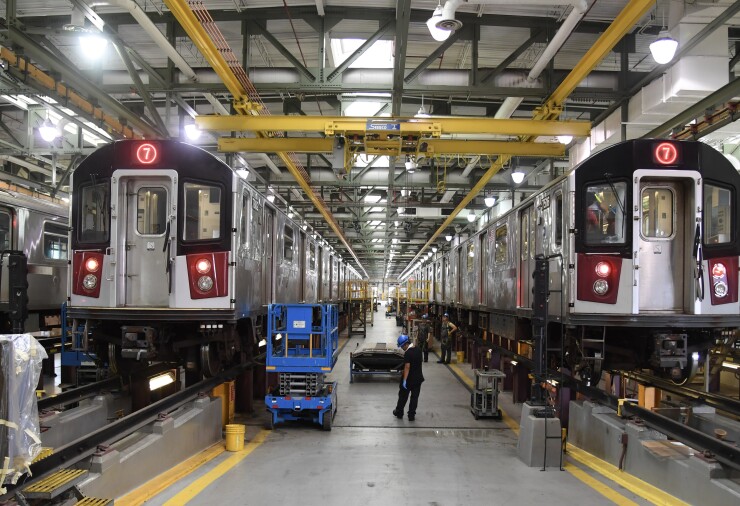Even with a board vote just five weeks away, the proposed five-year capital program for New York’s Metropolitan Transportation Authority is a big unknown.
Transit advocates are calling the process one of the most secretive since the program’s inception in 1982. They say it parallels in opaqueness the proposed AlixPartners reorganization plan for the transit agency.

“We need to see more vigorous oversight of the MTA [and] we could start with the capital plan, which we haven’t seen yet,” said Rachel Fauss, senior research analyst at the advocacy group Reinvent Albany. “The biggest thing the MTA does is the five-year capital plan.”
Her organization on Thursday released a
The MTA is one of the largest municipal issuers with roughly $43 billion in debt. The authority intends to sell $1 billion of Series 2019D transportation revenue bond anticipation notes competitively on Sept. 4, according to a preliminary official statement.
Fauss called for stricter oversight from Albany.
“The state legislature could be demanding that it be made public, and we could be holding hearings right now on it,” Fauss said at a workshop on the MTA hosted by the civic organization TransitCenter in Lower Manhattan.
The MTA operates New York City’s subways and buses, Long Island and Metro-North commuter railroads and several bridges and tunnels. Its board is scheduled to vote Sept. 25 on its capital program, expected to run up to $40 billion and which it will submit to a state review panel.
The MTA’s last capital plan, for $32 billion, waited 18 months for approval, and only after Gov. Andrew Cuomo brokered a complex deal that included a $2.7 billion contribution from the city.
“We don’t have a year and a half,” said Lisa Daglian, executive director of the watchdog Permanent Citizens Advisory Committee to the MTA. “We don’t have billions of dollars to waste. It’s really critical that the system start moving in the right direction because congestion pricing is coming.”
The legislature passed congestion pricing for Manhattan south of 60th Street, which could take effect in 2021 and could leverage $15 billion for MTA capital needs. Other new revenue streams include Internet and real estate taxes.
“However, they will not address potential future weakening in revenues supporting operations,” Moody’s Investors Service said.
Cuomo’s call for MTA reorganization that prompted the AlixPartners report accompanied the congestion pricing provision of the fiscal 2020 state budget.
“This is a great revenue stream for the MTA but it will force them to be accountable,” Mitchell Moss, director of New York University’s Rudin Center for Transportation Policy said of congestion pricing. “People are going to be steamed about paying a $16 toll.”
A key reorganization component, which could force the loss of up to 2,700 jobs, involves rolling 40 functioning groups within MTA agencies into six centralized departments, including a dedicated capital construction unit.
“I didn’t see anything very innovative or creative in that report,” Moss said. “It was just a rethink of traditional management structures, something any graduate student or professor could have done. It was a nice copy-and-paste job.”
Moss called the Morrison & Foerster
Buz Paaswell, former executive director of the Chicago Transit Authority and now a civil engineering professor at City College of New York, said board members should stand up to Cuomo and invoke fiduciary responsibility.

“If the governor says vote for A, and you know that project B is better, you should vote for project B. [If] they vote for project A, someone could sue them and say you’re breaking the law,” Paaswell said.
No government agency really wants the politics that goes with transportation, said Leon Daniels, a former managing director at Transport for London. That agency evolved from a 2000 transformation that included congestion pricing under Mayor Ken Livingstone.
Centralizing back-office functions is risky, Daniels added.
“As soon as you start to attach the fundamental function of the operating businesses, you get into some troubles,” he said. “And my advice is the [MTA] shouldn’t get into this area without considering what the consequences might be.”
He cited the transfer in London of a small unit that oversaw bus drivers’ toilets into “asset management” because the toilets were considered assets.
“The really good people who do asset management are looking after flyovers, bridges, tunnels, and major pieces of infrastructure,” he said. “So only some useless people were looking after bus-drivers’ toilets."
A political firestorm ensued that involved the trade unions and the mayor.
“One needs to go into this with your eyes open,” he said.





